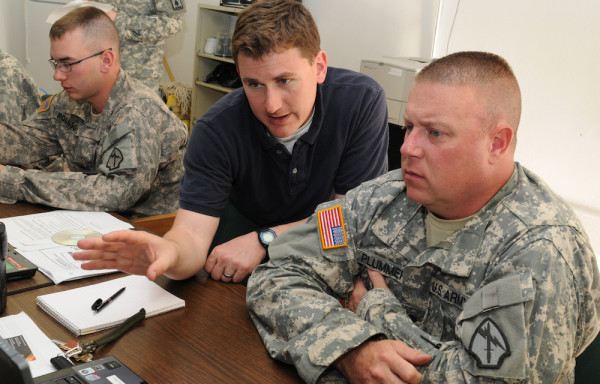

In a civilian job interview, it is important to translate your military skillset to your potential employer. With a little bit of thought and practice, you can anticipate the kinds of questions you’re likely to hear during a job interview. And you can prepare for them by having a friend or family member act as the interviewer. The goal is simple: you want to answer questions in a way that plays to your strengths.
An interviewer is going to ask three kinds of questions:
- “Tell me about yourself.”
- “Tell me about your qualifications and work history.”
- “Tell me about your interest in this job/company.”
Helping the interviewer understand how your military experience has made you ready for a work in the civilian world is one of the best ways to present yourself.
For instance, you can use your military experience to demonstrate things such as your ability to both follow orders and to give them; that you’re task oriented and able to problem solve; and that you’re accustomed to being part of a much larger team with a much broader mission.
Be prepared to give specific examples that can support statements about what you gained from your military experience. Remember that most civilians don’t understand military jargon, so be clear and thorough in your answers.
No matter the question, keep these four rules in mind:
- Always frame your answer in terms of the job you’re applying for.
- Be brief and don’t give long answers, but answer the question thoroughly. Then wait for the interviewer to ask any follow-up questions.
- Don’t let your tone become informal, “Yeah, that’s right,” should be, “Yes, that’s correct.”
- Don’t use slang or military acronyms.
The interviewer will have your resume in front of him or her, so they don’t want you to just list things they can read for themselves. This is your opportunity to give examples that support the experience you listed under your work history.
In answering questions, you want to use the STAR method. This will help you to keep yourself oriented to answering in a way that speak directly to the employer’s needs:
- Situation: What was happening? For instance, “We were tasked with bringing in three tons of supplies into a base. But it was night, and raining.”
- Task: What was your job? What responsibilities did you have? “My job was to coordinate with the supply and delivery team, and make sure that everything was offloaded, documented, and processed within a four-hour timeframe.”
- Activity: What action did you take? Notice this is different from the task. Activity is what you actually did, as in, “I had to physically check all the supplies, and then use our software to cross check to make sure that it had been delivered, tracked, and received.”
- Result: How did you deliver? “There were 14 missing items I discovered, which I was able to get a team together to locate and deliver. In the end, my team finished almost an hour ahead of schedule. I also noted why the supplies that were missing went missing, and was able to bring this to the attention of my supervisors so it wouldn’t happen again in the future.”
The STAR method will help you frame your experience into a short story. It makes something that is abstract, like “project management” much more tangible to a hiring manager.
Asking a friend or family member to interview you will be a tremendous help. You should ask them to find interview questions online, so that you won’t know what to expect. Set a timer for 30 minutes, and make the interview as real as you can.
You can also record it on your smartphone or computer, so you can watch yourself afterward. This will help you to identify places where you could make your answers more fluid or confident.
Having a good interview is 90% preparation and 10% luck. By following the advice here, and preparing for your interview, you can make sure that you walk into your next job interview ready to impress.